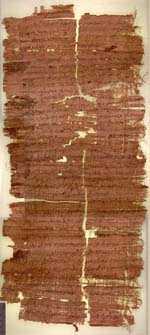
A special interest attaches to the date; it can be calculated that 2 October AD 325 was a Saturday. A decade or so earlier, government officials took Thursdays off. Here towards the end of the document (lines 36 ff.), at a time that can be calculated as around 5.40 p.m., it is announced that since the next day was the Lord’s Day, the hearing would be resumed on the day following. This text is both the earliest reference to the Lord’s Day in papyri and the earliest practical attestation of Sunday observance. That goes back to an edict of the emperor Constantine in AD 321, but the history of imperial dynastic events meant that Constantine’s edict would not have been effective in Egypt until late 324, a year before the date of this papyrus.
These proceedings were written on ‘waste paper’: on the back (not visible in the Ashmolean exhibition, but shown here) are seven columns of declarations of commodity prices by some of the local guilds six years before, part of a failed attempt by the government to control inflation.
The Oxyrhynchus Papyri vol.LIV no.3759